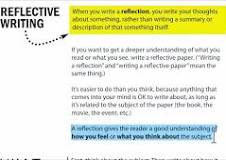The Art of Crafting a Critical Essay
A critical essay is a form of academic writing that involves analysing and evaluating a piece of literature, art, or any other work. It goes beyond summarising the content and delves into the deeper meanings, themes, and implications of the subject matter. Crafting a successful critical essay requires a combination of analytical skills, research, and coherent argumentation.
Key Components of a Critical Essay
Introduction: The introduction should provide background information on the work being analysed and present the thesis statement – the main argument or interpretation that will be explored in the essay.
Analysis: The body of the essay should consist of detailed analysis supported by evidence from the text or work under scrutiny. This analysis should focus on key themes, literary devices, character development, or any other relevant aspects.
Evaluation: In this section, the writer evaluates the strengths and weaknesses of the work being critiqued. This evaluation should be supported by examples and logical reasoning.
Conclusion: The conclusion summarises the main points discussed in the essay and restates the thesis while offering final insights or reflections on the significance of the analysis.
Tips for Writing a Successful Critical Essay
- Thorough Analysis: Take time to thoroughly analyse and understand the work you are critiquing before forming your arguments.
- Evidence-Based Arguments: Support your analysis with evidence from the text or work to strengthen your arguments.
- Critical Thinking: Engage in critical thinking by questioning assumptions, exploring contradictions, and considering alternative interpretations.
- Cohesive Structure: Ensure your essay has a clear structure with logical progression from introduction to conclusion.
- Edit and Revise: Review your essay for coherence, clarity, grammar, and style before finalising it.
In conclusion, crafting a critical essay is an intellectual exercise that requires careful analysis, evaluation, and argumentation. By following these guidelines and tips, writers can produce insightful critiques that contribute to scholarly discourse and deepen understanding of various works of art or literature.
Seven Advantages of Critical Essays: Enhancing Analytical Thinking and Academic Growth
- Encourages analytical thinking and deep engagement with the subject matter.
- Provides an opportunity to develop strong argumentation and persuasive writing skills.
- Promotes critical evaluation of literary works, art pieces, or any other content.
- Enhances research skills as writers gather evidence to support their analysis.
- Fosters a deeper understanding of complex themes and underlying messages in the work being critiqued.
- Allows for personal interpretation and expression of ideas within a structured framework.
- Contributes to academic growth by honing writing proficiency and critical reasoning abilities.
Challenges of Critical Essay Writing: Time, Subjectivity, Complexity, and Bias
Encourages analytical thinking and deep engagement with the subject matter.
A significant advantage of a critical essay is that it fosters analytical thinking and promotes deep engagement with the subject matter. By requiring the writer to delve beyond surface-level observations and instead analyse the content in detail, critical essays challenge individuals to think critically, question assumptions, and explore various perspectives. This process not only enhances one’s understanding of the subject but also encourages a more nuanced and thoughtful approach to interpreting complex ideas and themes.
Provides an opportunity to develop strong argumentation and persuasive writing skills.
Engaging in the practice of writing critical essays offers a valuable opportunity to cultivate robust argumentation and persuasive writing skills. By dissecting and evaluating complex subjects, individuals are challenged to construct compelling arguments supported by evidence and logical reasoning. This process not only enhances one’s ability to articulate coherent viewpoints but also sharpens their skill in persuasively conveying ideas to readers. Through the structured analysis and critique inherent in critical essays, individuals can refine their capacity to present convincing arguments effectively, fostering a deeper proficiency in the art of persuasive writing.
Promotes critical evaluation of literary works, art pieces, or any other content.
The primary benefit of a critical essay lies in its ability to foster a culture of critical evaluation towards literary works, art pieces, or any other content under examination. By encouraging readers to delve beyond surface-level interpretations and engage in analytical scrutiny, critical essays prompt individuals to explore the nuances, themes, and underlying messages embedded within the subject matter. This process not only enhances one’s understanding of the work being critiqued but also cultivates a deeper appreciation for the complexities and intricacies that often go unnoticed upon initial observation.
Enhances research skills as writers gather evidence to support their analysis.
Engaging in critical essay writing enhances research skills as writers gather evidence to support their analysis. Through the process of conducting research to find relevant sources and evidence, writers develop the ability to critically evaluate information, discern credible sources, and strengthen their arguments with solid evidence. This practice not only enriches the depth of analysis in the essay but also cultivates a habit of thorough investigation and informed reasoning, contributing to the writer’s overall academic and analytical proficiency.
Fosters a deeper understanding of complex themes and underlying messages in the work being critiqued.
A significant advantage of a critical essay is its ability to foster a deeper understanding of complex themes and underlying messages in the work being critiqued. By engaging in thorough analysis and evaluation, the writer can uncover intricate layers of meaning, symbolism, and nuances that may not be immediately apparent. This process allows for a more profound exploration of the subject matter, leading to insights that enhance the reader’s comprehension and appreciation of the work’s depth and complexity.
Allows for personal interpretation and expression of ideas within a structured framework.
Within the realm of critical essays, one significant advantage is the opportunity it offers for personal interpretation and expression of ideas within a structured framework. This pro allows writers to infuse their unique perspectives and insights into their analysis, fostering creativity and individuality in their critiques. By providing a structured framework, critical essays guide writers in presenting their interpretations cohesively and logically, ensuring that their ideas are effectively communicated to readers. This balance between personal expression and structured analysis not only encourages originality but also enhances the depth and richness of the discourse surrounding the subject matter at hand.
Contributes to academic growth by honing writing proficiency and critical reasoning abilities.
A significant advantage of engaging in critical essay writing is its contribution to academic growth by refining writing proficiency and enhancing critical reasoning abilities. Through the process of analysing and evaluating complex subjects, individuals are challenged to articulate their thoughts clearly and cohesively, thus improving their writing skills. Additionally, the practice of critically examining various perspectives and forming well-supported arguments fosters the development of robust critical thinking skills, which are essential for academic success and intellectual advancement.
Time-Consuming
Crafting a thorough critical essay can be a time-consuming process due to the extensive analysis and research required to delve deep into the subject matter. Gathering evidence, identifying key themes, and constructing coherent arguments demand careful consideration and attention to detail. The intricate nature of critically evaluating a work necessitates investing time and effort to ensure that the analysis is comprehensive and insightful. Despite being a challenging aspect, dedicating sufficient time to the critical essay process is essential for producing a well-rounded and intellectually engaging piece of writing.
Subjectivity
One notable con of critical essays is the inherent subjectivity they possess. Due to the diverse perspectives and backgrounds of writers, interpretations and evaluations within critical essays can differ significantly. This subjectivity introduces a level of bias that may influence the analysis and conclusions drawn from the work under scrutiny. As a result, readers must approach critical essays with a discerning eye, understanding that personal viewpoints and biases can impact the overall assessment presented in the essay.
Complexity
Navigating the con of complexity in writing a critical essay can indeed pose a significant challenge for many writers. The demand for a high level of critical thinking skills and analytical ability can be daunting, especially for those who are not accustomed to delving deeply into the complexities of literary or artistic works. Crafting a well-structured and coherent critical essay requires the writer to engage in rigorous analysis and evaluation, which may feel overwhelming or intimidating. Overcoming this hurdle involves honing one’s analytical skills through practice, seeking guidance from mentors or resources, and embracing the opportunity to enhance one’s intellectual capabilities through the process of writing critically.
Potential Bias
One significant drawback of critical essays is the potential for bias to impact the analysis and evaluation of the work. This risk is particularly heightened when writers bring preconceived notions or personal preferences into their critiques. Such biases can cloud judgement, leading to skewed interpretations and evaluations that may not accurately reflect the true merit of the subject under scrutiny. It is essential for writers to remain vigilant against bias, striving for objectivity and fairness in their assessments to ensure a more balanced and credible critical essay.




